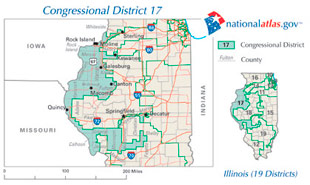On September 22nd, the Illinois Senate Redistricting Committee held its third hearing at Bradley University to discuss current legislative proposals for changing the way Illinois redistricts congressional and state legislative seats following the 2010 census. As a member of the Illinois Reform Commission, I testified for over two hours on our recommendations to overhaul the current redistricting process that has now been codified into Senate Joint Resolution Constitutional Amendment 69 (SJRCA 69). We do not feel that our proposal is the only viable solution, but feel that any meaningful reform should include the following changes.
- Get rid of Illinois’ crazy tie-breaker system. Illinois is the only state in America that has a “winner-take-all” lottery system wherein the Secretary of State draws a name out of a hat. One year, they drew the name from Lincoln’s stove pipe hat! If the Republican name is drawn, then the GOP controls the map-drawing process. If the Democratic name is drawn, they determine the legislative boundaries for the next 10 years. This crazy process must end.
- Take the map-drawing process away from the politicians. The trend in America is for states to take the legislative map-drawing process directly out of the hands of legislators and have them drawn up by bipartisan commissions with bipartisan approval of legislative bodies. It is common sense that legislators should not be able to choose their own voters. The 17th Congressional District (see map) is the poster child for gerrymandered districts in the country. Is it good government for a member of Congress who lives in Moline to represent a district that snakes down the Mississippi River, crosses through Springfield on one road, and reaches over to the center of Decatur? This map was drawn to create a “safe” seat for an incumbent. Or, take Illinois Senate District 38, which has an unusual tail on the end of the district to take in the residence of the incumbent’s fiancée. These districts are an affront to democracy. Illinois must do much better after the 2010 census.
 The redistricting process must be transparent. One of the reasons that the current redistricting system has been allowed to survive is because it has been done behind closed doors in secrecy. Elected officials or their operatives look at the party affiliation of voters block by block and draw maps to protect incumbents. SJRCA 69 sets up a bipartisan Temporary Redistricting Advisory Committee (TRAC), which would hire an independent redistricting consulting firm that uses computer software to draw the new maps. TRAC must conduct public hearings on the maps around Illinois to get public input.
The redistricting process must be transparent. One of the reasons that the current redistricting system has been allowed to survive is because it has been done behind closed doors in secrecy. Elected officials or their operatives look at the party affiliation of voters block by block and draw maps to protect incumbents. SJRCA 69 sets up a bipartisan Temporary Redistricting Advisory Committee (TRAC), which would hire an independent redistricting consulting firm that uses computer software to draw the new maps. TRAC must conduct public hearings on the maps around Illinois to get public input.- Minority voting rights must be protected. The redistricting process must ensure that Section 2 of the Voting Rights Act is followed to ensure compliance with federal law. Importantly, this enables minority candidates to have a chance at getting elected to Congress and the Illinois General Assembly, promoting diversity in our legislative bodies.
- New maps should be approved in a bipartisan vote. SJRCA 69 calls for a two-thirds approval vote of the new maps of the Illinois General Assembly or Illinois Supreme Court. This will ensure that one party cannot control the redistricting process. Some of the current legislative proposals call for a 60-percent approval vote that would allow the Democratic Party to control the redistricting process under the current makeup of the Illinois Legislature.
Hopefully, a legislative constitutional amendment will be placed on the November 2, 2010 election ballot to change our current redistricting process according to the aforementioned principles. If not, then a broad coalition of reform-minded organizations may need to band together to get a direct voter ballot constitutional amendment on the ballot. Petitions for a direct voter ballot initiative need to be filed with the Secretary of State by May 2, 2010.
The redistricting process is fundamental to creating a healthy two-party system with competitiveness and accountability. The system should protect the interests of Illinoisans, not political interests. iBi


